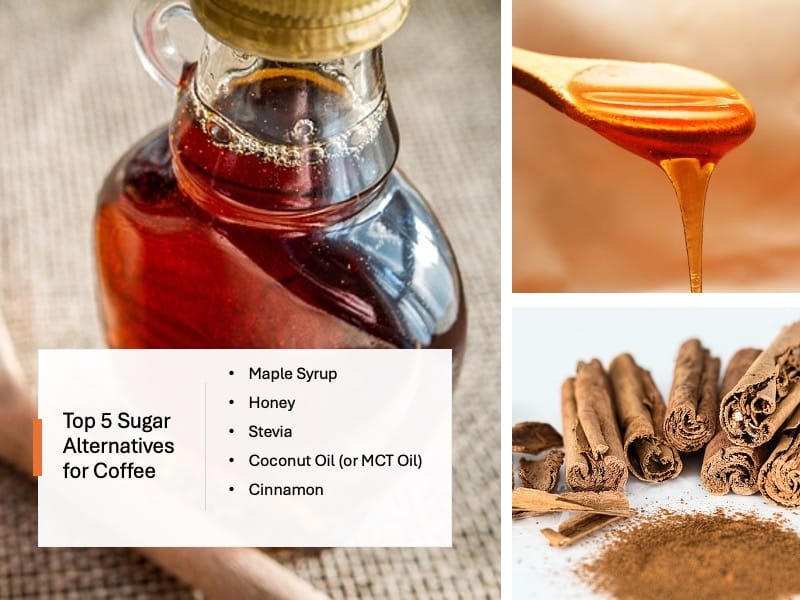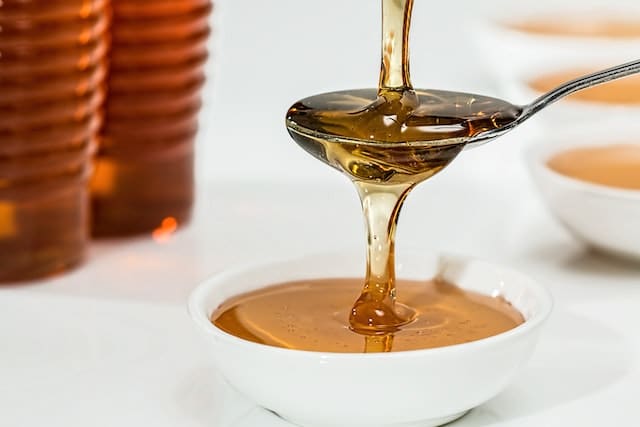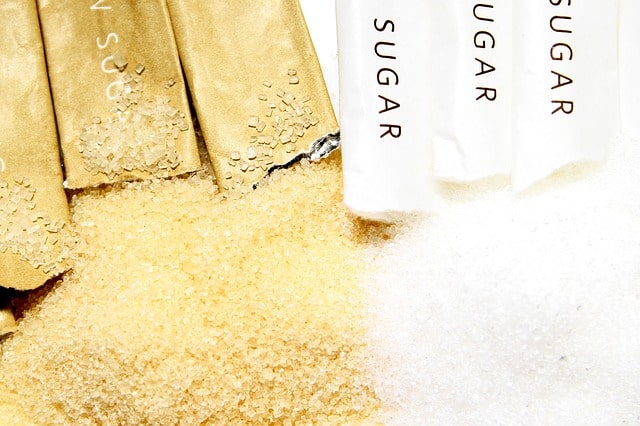the 5 Best Sugar Alternatives for Coffee (Healthy & Tasty!)
For countless people worldwide, coffee is essential to their daily routine.
Adding sugar to coffee is a common practice, but with the growing awareness of health risks linked to excessive sugar consumption, it’s crucial to consider healthier alternatives.
This article explores the best sugar alternatives for coffee, which include:
- Maple Syrup
- Honey
- Stevia
- Coconut Oil (or MCT Oil)
- Cinnamon
We’ll explore why each option makes an excellent sugar alternative for coffee and the potential health benefits they offer.
Why Should You Stop Putting Sugar in Your Coffee?
While coffee can provide many health benefits, adding sugar to your cup of joe can adversely affect your health.
Sugar is a simple carbohydrate that is quickly absorbed into the bloodstream, leading to a rapid spike in blood sugar levels.
This spike can cause a release of insulin, a hormone that helps regulate blood sugar levels, but over time, frequent spikes in blood sugar levels can lead to insulin resistance and eventually type 2 diabetes.
Furthermore, excessive sugar consumption has been linked to various chronic diseases, including obesity, heart disease, and cancer.
It can also cause inflammation in the body, leading to a higher risk of chronic diseases.
In addition to health concerns, consuming sugar can also cause crashes in energy levels and mood.
After the initial spike in blood sugar, there is often a subsequent crash, leading to feelings of fatigue and sluggishness.
For these reasons, it is crucial to avoid adding sugar to coffee and explore healthier alternatives to sweeten your beverage.
The best sugar alternatives for coffee that are discussed in this article can provide a natural sweetness to your coffee without the negative health consequences of sugar.
Healthiest Alternatives to Sugar for Your Coffee

Using healthy sugar alternatives for coffee is crucial because it avoids the harmful effects of consuming too much sugar.
Coffee has many potential health benefits, such as reducing the risk of type 2 diabetes, liver disease, and certain types of cancer.
Additionally, coffee is good for weight loss and weight management, but adding excessive amounts of sugar to your coffee can mitigate these beneficial properties.
Adding sugar to coffee can negate the health benefits of coffee by causing inflammation, promoting increased calorie intake, and creating an increased risk of chronic diseases such as heart disease and diabetes.
Therefore, replacing sugar with healthier alternatives such as maple syrup, honey, stevia, coconut oil, MCT oil, or cinnamon can improve the overall nutritional value of coffee while maintaining its potential health benefits.
Maple Syrup
Maple syrup, a natural sweetener extracted from the sap of sugar maple trees, is a superb sugar alternative for coffee.
Its rich, earthy sweetness elevates your coffee experience without the empty calories found in refined sugar.
Maple syrup is an excellent source of antioxidants and essential minerals like manganese and zinc, which can support immune system function and maintain overall health.
Moreover, maple syrup has a lower glycemic index than sugar, causing fewer spikes in blood sugar levels when consumed.
Honey

Another natural sweetener, honey, can add sweetness to your coffee while providing various health benefits.
Honey contains vitamins, minerals, and antioxidants that contribute positively to your well-being.
Raw honey also has antibacterial and anti-inflammatory properties, making it a healthier choice than sugar.
However, it’s essential to use honey sparingly, as it still contains calories and natural sugars.
Stevia
Stevia, a zero-calorie, natural sweetener extracted from the leaves of the Stevia rebaudiana plant, is an ideal alternative for those watching their calorie intake.
It is 200-300 times sweeter than sugar, so only a small amount is needed to achieve the desired sweetness.
Stevia can aid in managing blood sugar levels and doesn’t contribute to excessive calorie intake or tooth decay.
Opt for pure stevia extract to avoid any added ingredients or fillers.
Coconut Oil (or MCT Oil)
Incorporating coconut oil into your coffee creates a creamy and rich flavor without resorting to sugar.
Coconut oil contains medium-chain triglycerides (MCTs), which are easily absorbed by the body and offer a quick energy source.
Bulletproof coffee, a popular trend, combines coffee, grass-fed butter, and MCT oil (or coconut oil) to create a frothy, satisfying beverage that can replace breakfast and boost energy levels.
Coconut oil also has antimicrobial and antifungal properties, which can support gut health.
MCT oil, derived from coconut or palm kernel oil, is a more concentrated source of medium-chain triglycerides.
While it shares some benefits with coconut oil, like providing quick energy, it doesn’t impart the same coconut flavor.
MCT oil can be a suitable option for those who want MCTs benefits without significantly altering their coffee’s taste.
Cinnamon
Cinnamon is one of the best ingredients you can add to your coffee for weight loss, and it is a delicious and aromatic spice that offers numerous health benefits.
Cinnamon can help regulate blood sugar levels, reduce inflammation, and is rich in antioxidants.
You can add about one teaspoon of cinnamon in coffee to help with weight loss, enhance the flavor, and provide a natural sweetness without adding sugar.
Furthermore, cinnamon has been linked to improved heart health and may have neuroprotective properties.
Final Thoughts: Best Alternatives to Sugar for Coffee
Sugar alternatives like maple syrup, honey, stevia, coconut oil, MCT oil, and cinnamon can help reduce sugar intake while providing various health benefits.
Experiment with these alternatives to find the perfect balance of flavor and sweetness in your coffee.
These healthier sugar alternatives can make your daily coffee ritual more enjoyable and beneficial to your overall well-being.
Embrace your creativity and try new recipes incorporating sugar alternatives for a unique and satisfying coffee experience.
By exploring these sugar substitutes, you can indulge in your favorite beverage without compromising your health goals.



